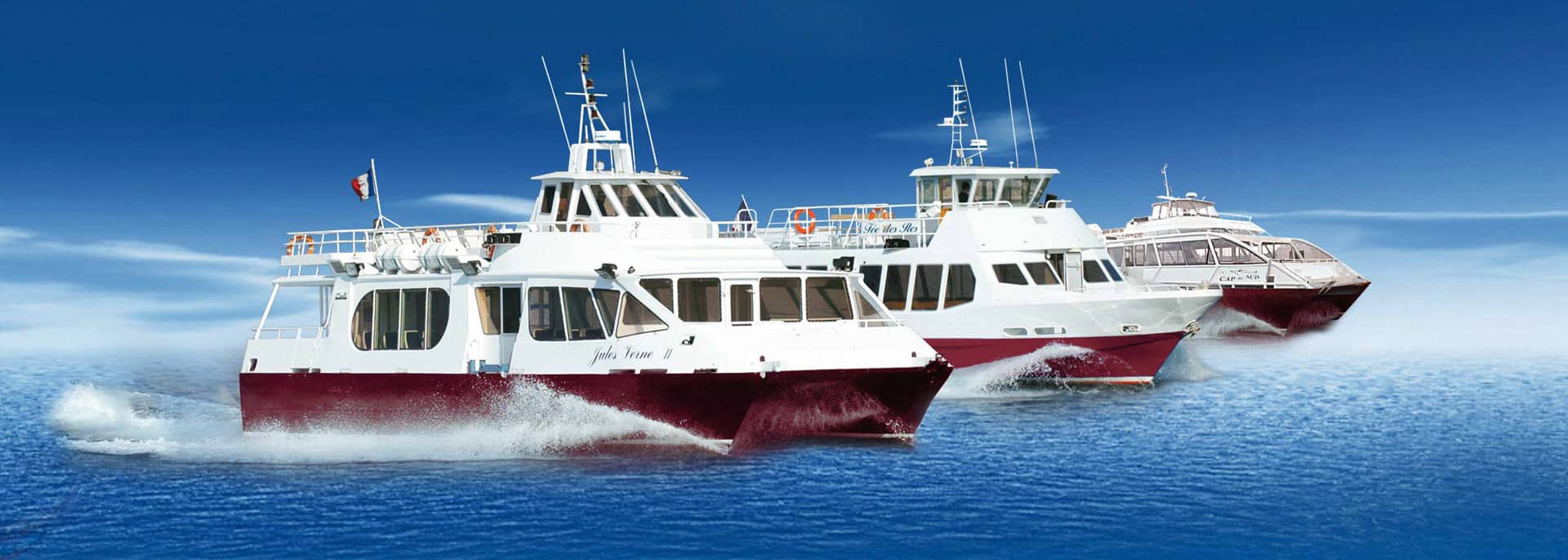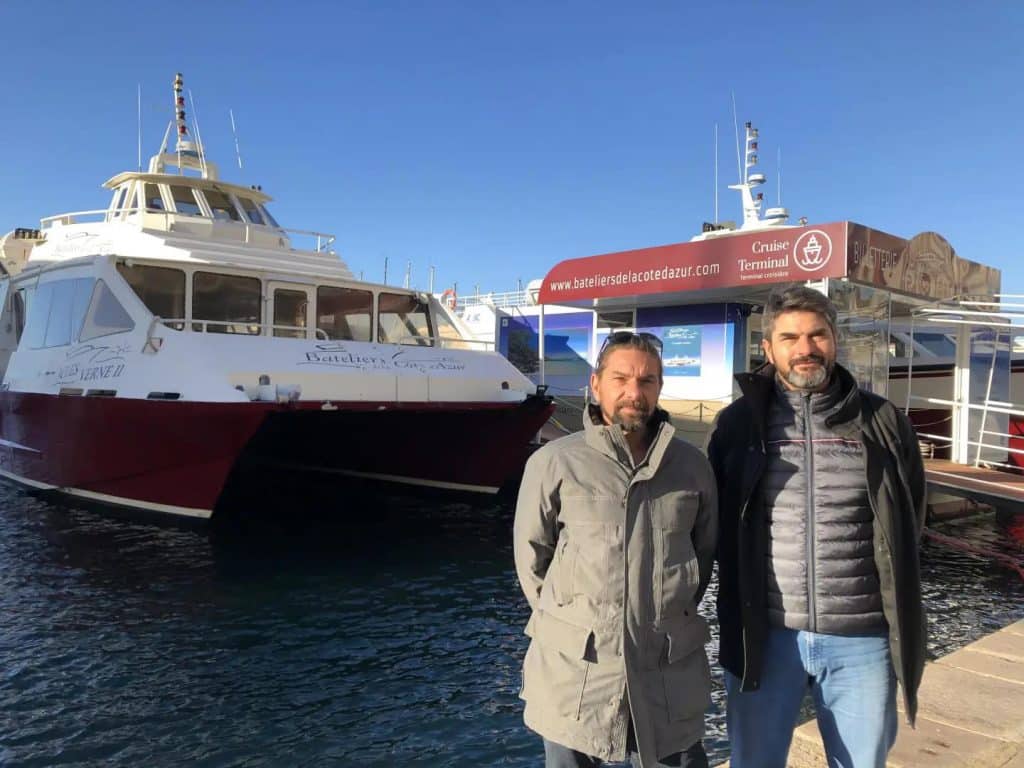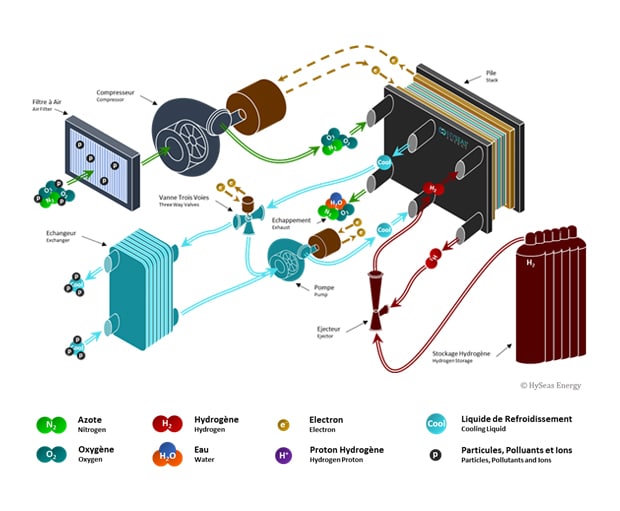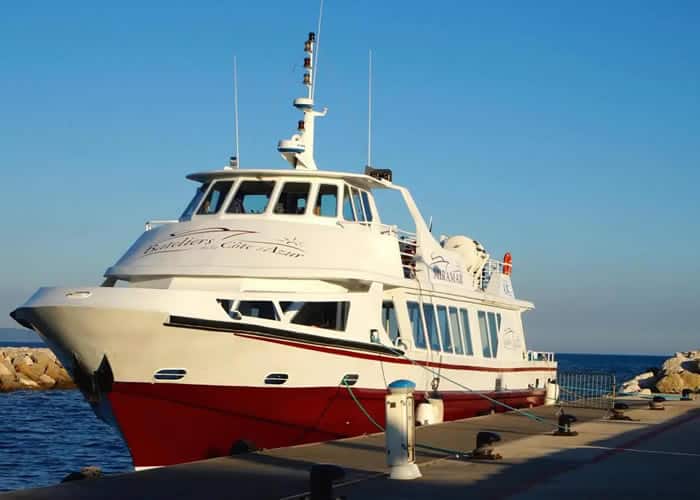
Our commitment to the future: A greener fleet
A world first in the colours of the south!
Take two Toulon born boys, passionate about the sea, who decides to rise to the challenge of a successful energy transition for their company. Take the meeting with an equally motivated start-up sharing the same vision and objectives. Add up a world challenge and you get the story of one hell of a team headed towards an achievement that will have a global reach.
Founded in 1998 by Yves and Christophe Arnal, the company Bateliers de la Côte d’Azur has never ceased to evolve towards a better service to their passengers while preserving the natural beauty of the Mediterranean.
Both brothers quickly realized that their activity had a negative ecological impact mostly due to their high carbon footprint. The case was closed, we need to develop clean ships! From this point onward, they began investing in new engines for 4 out the 6 vessels the company operates. With close to 250 000 euros of investment per ship, it is a sizeable amount, but we need to do more and do better.
A game changing encounter
The true ecological turning point for the Bateliers de la Côte d’Azur will happen in 2016 when they meet for the first time Arnaud Vasquez, founder of the start-up HySeas Energy. Equally passionate about the sea but also about ecology and clean technologies, Arnaud and his team develop a marine hydrogen fuel cell system.
One has the fleet, the other the technology. They share the common goal of developing zero emission ships that are perfectly safe for the passengers. They shook hands and the project Telo Martius was born.

A challenge with very high stakes
The technology is mature enough today to go the next stage: Developing everything around it to ensure the perfect safety of the passengers and the viable operation. Since no such ship exists today, all the necessary regulations need to be created in conjunction with the ongoing R&D work.
However, the Bateliers and HySeas are not the only one to come up with such a concept. Several other marine projects have also emerged throughout the world; hence a group of maritime hydrogen developments have been created to share information and help building the world’s normative framework.
This work is led in Norway, at the head office of DNV-GL, the classification society specialized in industrial and maritime risk analysis and safety measures. They chose Telo Martius as a study and use case, making this Toulon based project also a site where best practices will be developed.
But what is that marine hydrogen engine... fuel cell... thingy?
Hydrogen is a gas which, when recombined with the Oxygen in the air through a fuel cell system, produces electrical energy and only water as a by-product. This clean energy is stored in a compressed gaseous format and this gas is completely harmless to the environment. The carbon footprint of the vessel between the building of the vessel until is dismantling will therefore be extremely small and will not emit any CO2 while in operation.
You may wonder why they didn’t choose the battery electric propulsion? After all, this technology is well known and the path towards it quite clear. That would be missing the fact that batteries are far from having a clean carbon footprint. It generates large amount of emissions during its manufacture and has a less than ideal lifecycle. Beyond its poor environmental impact batteries are heavy and recharging time are incompatible with a proper marine activity. As it turns out, Arnaud calculated that they would require 28 tonnes of batteries for an equivalent amount of energy… And there rest the big differences between batteries and hydrogen. The future ship will make use of a buffer batterie but this one will be much smaller and last the full lifetime of the ship which is 25 years.
One other advantage is the recharging time. This one will allow the same short time and flexibility as found today once the refuelling station will be built.

When will we see Hydrogen ships in the bay of Toulon?
The early stages of 2022 will see the vessel beginning trials. This is the necessary time required to finalize such a historic project for the maritime world. All is aligned and pointing towards a French success. Humble and cautious, Yves explains that “If we pull this off, it will be with the sense of personal pride in having achieved a world first”
We are in the media

HySeas Energy, a one of a kind marine equipment supplier in the making
Regarding ships, Arnaud knows his stuff! Starting his career at the age of 16 as a marine engineer apprentice onboard the infamous “Melusine”;. An old, noisy, clattering and smoking military transport ship based in Saint-Mandrier. After a few years in the Navy, Arnaud naturally moves towards commercial shipping and spends a large portion of his career in the engine rooms to end up as captain. During this time, hydrogen technologies get his attention and he develops the ambition to marry his two passions. In 2015, all the right conditions are united to create the start-up HySeas Energy. Just only one year after that, he is presented with the opportunity to replace his old original ship with a clean one… it’s a no-brainer, he jumps on the occasion and starts the collaboration.
Arnaud feels very fortunate to have met both brothers “Shipowners like Yves and Christophe are few and far between.
Many would like to take a part in the evolution of marine activity, but very few actually dare to do it all the way”.
Beyond hydrogen fuel cells...
The goal of HySeas Energy is to become a specialist marine equipment supplier. Their solutions will be industrialised, covered by warranties and fully certified. Exactly what is expected from regular equipment supplier today.
Beyond the development of its own marine fuel cells, HySeas also works on environmental projects such as transformation of marine plastic pollution into hydrogen via specialist ceramics and also collaborates on two thesis on Bio-PEM’s based on Enzymes and on Hydrogen production using Cyanobacteria’s.

